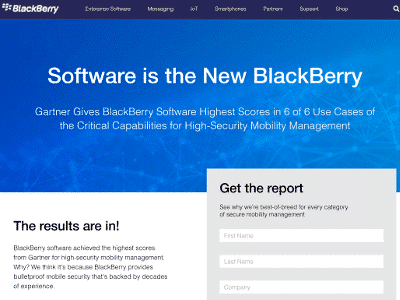BlackBerry records Q1 US$670 million loss, do-or-die scenario for handset division

 At one point in recent history, it would have been more or less accurate to describe BlackBerry (NASDAQ:BBRY)(TSX:BB) as the “Waterloo handset manufacturer and enterprise software giant”, but with its most recent earnings report, revealed at its annual general meeting in Waterloo on Wednesday and officially released Thursday, those other journalistic adjectives, like “struggling” and “troubled” and “former”, are increasingly difficult to shake.
At one point in recent history, it would have been more or less accurate to describe BlackBerry (NASDAQ:BBRY)(TSX:BB) as the “Waterloo handset manufacturer and enterprise software giant”, but with its most recent earnings report, revealed at its annual general meeting in Waterloo on Wednesday and officially released Thursday, those other journalistic adjectives, like “struggling” and “troubled” and “former”, are increasingly difficult to shake.
John Chen’s “recovery plan” is still on track, according to the CEO, who has taken steps to right the BlackBerry ship during his tenure.
All the same, a US$670 million GAAP net loss in Q1 2017, which translates to $1.28 per share, isn’t encouraging.
BlackBerry posted sales of $2.2 billion in the previous fiscal year, the lowest level since 2006, with its share price falling 20% during over a 12-month period.
At the AGM on Wednesday, attended by around 100 people, Chen saw off an investor challenge to executive compensation.
Chen’s salary has already dropped 96% from US$85.7 million in 2014, most of it in the form of restricted shares that vest over a five-year period, to $3.4 million in the 2015 fiscal year.
On the handset front, BlackBerry recorded device sales of approximately 500,000 units with an average sales price of $290.
That is down from 600,000 in Q4 2016 and 700,000 in Q3.
BlackBerry’s base of phone users has fallen to 23 million from 79 million in 2012.
The smartphone segment generated $152 million of revenue and had a $21 million operating loss in Q1, nearly breaking even, with an adjusted loss of US$1 million, taking into account BlackBerry’s other, more profitable divisions.
Chen seems optimistic, though, that with the introduction of two new devices in the pipeline, both less expensive versions of the Priv, one with a physical keyboard and the other without so that it resembles an Android version of the Z30, BlackBerry’s handset division may just be able to turn a profit again.
“The device business must be profitable. We don’t want to run a business that drags on the bottom line,” said Chen said at the AGM. “We’ve got to get there this year.”
As many analysts who wish that BlackBerry would simply cut its iconic phone hardware business loose point out, BlackBerry is doing quite well if you subtract hardware from its business.
During a call with investors this morning, Chen noted the “very robust growth” recorded by BlackBerry’s Q1 software and services division revenue of $166 million, the highest in company history, a figure which is up 21% year-over-year, and driven largely by the 526 enterprise customers that purchased a Good Secure EMM Suite during Q1.
“I’m very pleased with our momentum,” said Chen, referring to the strong enterprise and government adoption of EMM software, AtHoc, and automotive software subsidiary QNX.
“The device business must be profitable. We don’t want to run a business that drags on the bottom line. We’ve got to get there this year.” – John Chen
Chen said that BlackBerry recorded orders from 3,300 enterprises and organizations in Q1, including from the government of Canada, U.S. liquid petroleum operator Buckeye Partners, financial and commodity markets network Intercontinental Exchange, legal firms such as Reed Smith, Sullivan and Cromwell and Clifford Chance, Macquarie University in Australia, Great Western Railways, Salt Lake City Airport, the U.S. Senate, the Pentagon Force Protection Agency, the California Department of Justice and the U.S. Coast Guard.
In the past year, BlackBerry re-launched its global enterprise partner program, signing 107 new partners, including a software distribution agreement with HCL in India, which represents a 10% increase of of its global partner count.
Chen also pointed to two enterprise proof of concept trials underway with regard to its BlackBerry Radar end-to-end asset tracking system, aimed at trucking companies and private fleet operators looking to leverage secure IoT technology.
BlackBerry expects a full launch in July for BlackBerry Radar.
As well as BlackBerry is performing in every other aspect of its business, the question on everyone’s mind remains whether BlackBerry will continue making phones.
John Chen declined to discuss the matter in the morning earnings call, saying only that he’ll have more news in July, perhaps during the BlackBerry Security Summit, which takes place on July 19 in New York.
Every indication points to the fact that BlackBerry has no intention of stopping making its phones, with Chen striking an optimistic tone that while the company will likely never recover its preeminence in the smartphone market, it will at least increase its market share to the point where the handset division doesn’t hang an anchor around the neck of the rest of the company, without needing to be propped up by the other, more successful BlackBerry divisions.
If the handset division isn’t profitable by the end of this fiscal year, Chen is quite firm that he has no qualms about calling it a day and concentrating on the aspects of BlackBerry’s business that make financial sense.
Investors do not appear to be punishing BlackBerry’s performance, though, with the share dropping steeply from $9.08 on the TSX yesterday morning, before the AGM, to $8.63 by the end of the day, and then right back up to $8.94 this afternoon, after John Chen’s Q1 phone call with investors and his media blitz around the talk shows.

Terry Dawes
Writer


